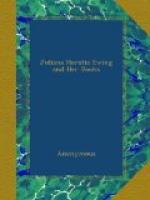During the six months that my sister resided in York she wrote a few contributions for Aunt Judy’s Magazine. To the number for January 1879 she gave “Flaps,” a sequel to “The Hens of Hencastle.”
The latter story was not written by her, but was a free adaptation which Colonel Yeatman-Biggs made from the German of Victor Bluethgen. Julie had been greatly amused by the tale, but, finding that it ended in a vague and unsatisfactory way, she could not be contented, so took up her pen and wrote a finale, her chief aim being to provide a happy ending for the old farm-dog, Flaps himself, after whom she named her sequel. The writing is so exactly similar to that of “The Hens,” that the two portions can scarcely be identified as belonging to different writers. Julie used often to reproach me for indulging in what John Wesley called “the lust of finishing,” but in matters concerning her own art she was as great an offender on this score as any one else!
Julie gave a set of verses on “Canada Home” to the same number as “Flaps,” and to the March (1879) number she gave some other verses on “Garden Lore.” In April the second part of “We and the World” began to appear, and a fresh character was introduced, who is one of the most important and touching features of the tale. Biddy Macartney is a real old Irish melody in herself, with her body tied to a coffee-barrow in the Liverpool Docks, and her mind ever wandering in search of the son who had run away to sea. Jack, the English hero, comes across Biddy in the docks just before he starts as a stowaway for America, and his stiff, crude replies to her voluble outpourings are essentially British and boy-like:—
“You hope Micky ’ll come back, I suppose?”




